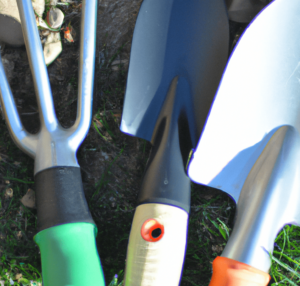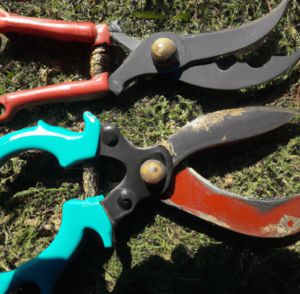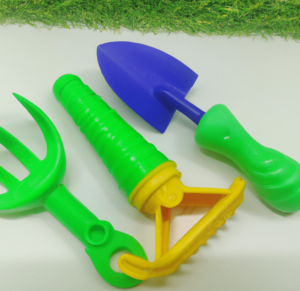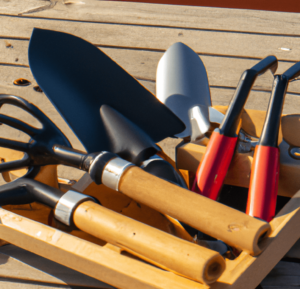Both hand tools and power tools are necessary for a variety of applications, from easy do-it-yourself chores to challenging construction jobs. Hand tools have many advantages over power tools, making them a vital addition to any tool collection while power tools offer convenience and speed. If you’re wondering about the benefits of using hand tools over power tools in gardening, here’s what you need to know.
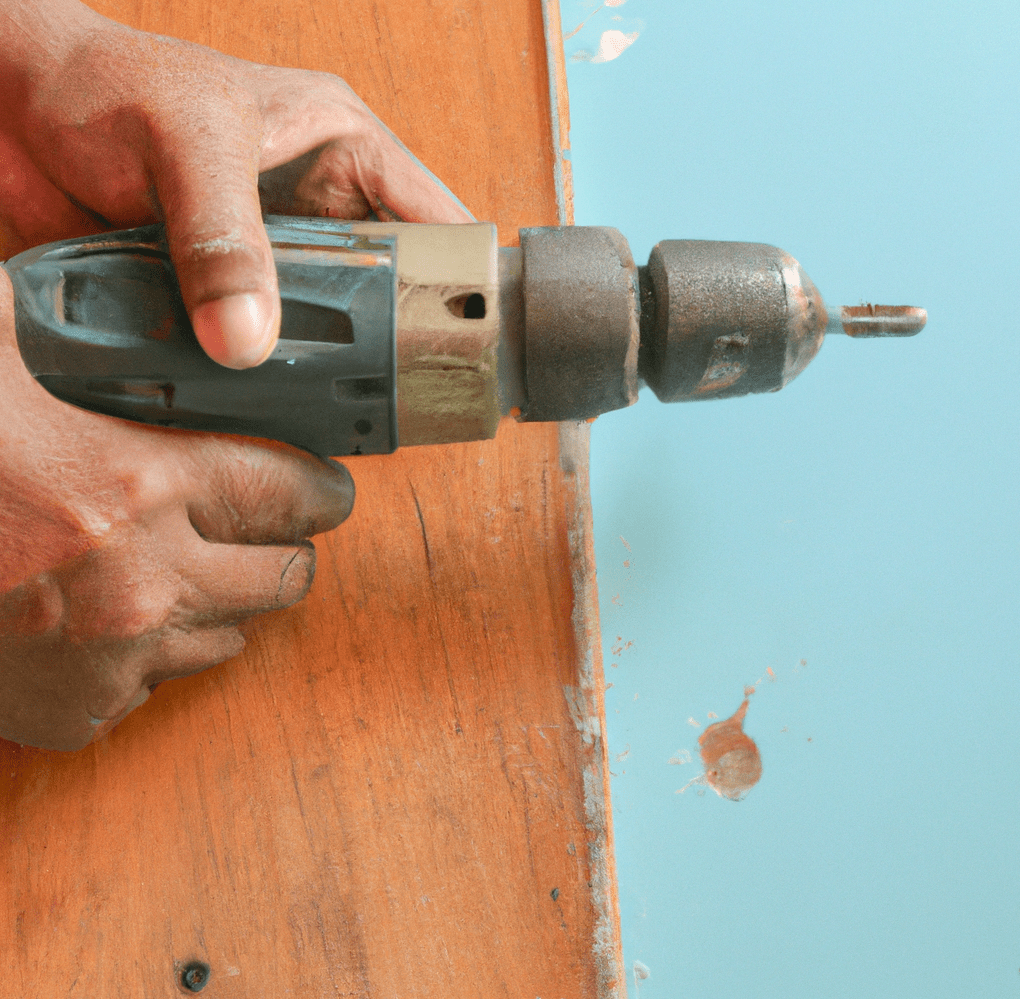
Benefits of Hand Tools
Hand tools are a wonderful addition to any tool collection since they have a number of advantages over power tools. The benefits of using hand tools over power tools include adaptability. Hand tools can be used everywhere and don’t need electricity, in contrast to power tools, which are restricted by the power source and their electrical needs.
They’re perfect for jobs where using power tools could be hazardous, such as those that are distant or off-site. Also, hand tools frequently offer greater control and allow for finer workmanship than power tools since they are more exact. Hand tools are a cost-effective investment for companies since they are robust and long-lasting and do not need to be replaced frequently like other machines and power tools.
Increased Precision and Control
The improved accuracy and control that hand tools may offer are the benefits of using hand tools over power tools. For instance, when dealing with wood, a hand instrument like a hand saw enables the operator to make cuts with greater control and accuracy than a powered saw. The finished product benefits from greater control and precision, which also lowers the possibility of errors and accidents.
Because the user has total control over the tool when using a hand tool, it’s easier to make fine cuts and modifications as needed. Additionally, using hand tools gives the user a better sense of the texture, grain, and hardness of the material they are working with and enables them to make adjustments accordingly. Hand tools are a great addition to any tool collection for woodworkers, carpenters, and DIY enthusiasts alike due to the enhanced precision and control they offer.
Ability to Make Fine Adjustments
The capacity to make precise changes is another one of the benefits of using hand tools over power tools, which is crucial when working with fragile materials like wood. Hand tools enable the user to make accurate and gentle adjustments, ensuring that the material is not destroyed in the process, unlike power tools, which can easily overcut or damage a piece. When working on complicated or detailed tasks, when even a small error can completely damage the item, this is very crucial.
Additionally, using hand tools enables the user to conduct ongoing maintenance inspections as the project develops. A hand plane, for instance, can be used to smooth away rough edges or to precisely alter the wood’s surface. Hand tools are perfect for detailed work since they allow for little modifications, such as when carving, inlaying, or constructing tiny joints.
Additionally, hand tools frequently need less care and maintenance than powered equipment even though the role of technology in gardening tools and equipment has gotten bigger over the past few years, making them a more cost-effective choice for projects that call for regular modifications and exquisite craftsmanship. One of the main advantages of hand tools that makes them a great addition to any tool collection, especially for woodworkers and carpenters, is their capacity to make precise adjustments.
Greater Dexterity and Range of Motion
Power tools just cannot compare to the dexterity and range of motion offered by hand tools. The benefits of using hand tools over power tools include the fact that they can be modified and used in a much more exact and controlled way. When working on delicate and complex jobs, such as those involving exquisite woodworking or sophisticated carpentry, this is especially helpful.
With hand tools, the user is in complete control and may make all necessary changes and motions to get the desired result. A higher degree of accuracy and refinement is possible when both hands are available and the instrument can be adjusted as necessary. When opposed to utilizing power tools, this level of control also implies that the user is less likely to make mistakes or harm the project.
Additionally, because they are constructed from higher-quality materials and require less maintenance than power tools, hand tools often have a longer lifespan. This means that the user can rely on hand tools to operate well for a long time without having to replace them or fix them frequently.
Reduced Risk of Injury
In comparison to power equipment, hand tools have a lower chance of injury, which is another one of the benefits of using hand tools over power tools. Power tools can be dangerous if not used properly due to their electrically powered motors and fast speed. Because accidents can cause harm or even death, this poses a risk to both the user and the employer. However, because hand tools are operated manually and do not require electricity, they are generally safer to use.
Hand tools are an appealing alternative for companies since they help to establish a safer working environment and lower the likelihood of workplace accidents due to the reduced danger of harm. In addition, hand tools frequently produce less noise than power tools, which lowers the user’s risk of hearing damage. Also, a lot of the best gardening tools for children are hand tools.
Less Vibration and Noise
Another advantage of using hand tools is that they frequently make less noise and vibration than motorized tools and machinery. They are therefore perfect for usage in settings like homes or sensitive regions where decreasing noise and vibration is crucial. Due to less strain on the user’s hands and arms, the absence of vibration also lowers the danger of injury and weariness. Hand tools are also more appropriate for usage at night or in locations where excessive noise is prohibited because of their lower noise levels.
Furthermore, the lower vibration and noise level of hand tools contributes to a longer tool and workpiece lifespan because excessive vibration can harm both over time. Hand tools often have simpler designs and don’t need specialist equipment or training to maintain, making routine maintenance easier. Hand tools are a wonderful addition to any tool collection for individuals wishing to decrease noise and vibration in their working environment due to their lower vibration and noise levels.
No Cords or Power Source Required
One of the benefits of using hand tools over power tools is that they are highly portable and convenient to use because they don’t need a power source or wires. They’re a great choice for businesses and employees who have on-site or distant project requirements. Hand tools may be used anywhere and at any time, which makes them perfect for outdoor or mobile work. Powered tools, on the other hand, need access to energy and may be constrained by the length of their cords.
The safety of hand tools is also increased by the lack of cords and power source requirements because there is no possibility of electrical shock or fire from a damaged cord. For individuals working in dangerous locations, such as building sites or regions with combustible materials, hand tools are a crucial addition to any tool collection.
Increased Durability
Since hand tools do not rely on electrical components that can degrade or break over time, they are often more durable than powered equipment. Because of their enhanced durability, hand tools are now a wise investment for both employers and employees because, with the right upkeep and care, they may endure for many years. They’re also less prone to malfunction due to the absence of electrical components, which lowers the possibility of accidents at work and downtime and is one of the benefits of using hand tools over power tools.
Furthermore, hand tools can frequently be sharpened or mended if they suffer damage, thereby prolonging their lives. For individuals searching for tools that can last for many years, hand tools are a wonderful addition to any tool collection due to their enhanced durability.
No Need to Replace Batteries or Plug-In
One of the benefits of using hand tools over power tools is that they don’t need batteries or plug-in power, so there’s no need to find a power source or change batteries all the time. As a result, hand tools can be used constantly without interruption, giving dependable and consistent results. In contrast, powered tools may require plug-in power or routine battery change, which can be cumbersome and time-consuming.
Furthermore, since hand tools are not dependent on batteries or a power source, there is no chance of power outages or battery failure, which makes them more dependable and less prone to downtime. For those searching for dependable and consistent performance, this makes hand tools a great addition to any tool collection.
Longer Lifespan
Because they are normally made of high-quality materials and don’t rely on electrical components that can break or wear out over time, hand tools are renowned to last longer than powered equipment. Because they can be maintained and cared for properly, hand tools are a worthwhile investment for both employers and employees.
Additionally, since hand tools don’t contain any electrical components, they are less likely to break down and cause downtime at the office. Furthermore, hand tools can frequently be sharpened or mended if they suffer damage, thereby prolonging their lives.
When it comes to cutting wood, hand instruments like hand saws and chisels give a level of control and precision that powered machines find challenging to match. A smoother, more accurate cut may be made with the flexibility to make small adjustments and manage the cutting angle and pressure, leading to a superior completed product.
Economic Benefits
One of the benefits of using hand tools over power tools is their economic benefits. Hand tools can be used continuously without needing to buy new batteries or other power sources because they don’t depend on either. Additionally, because they don’t need to be changed as frequently as powered instruments, hand tools are a more cost-effective investment in the long run.
Additionally, hand tools frequently don’t need routine upkeep like cleaning or lubrication, which lowers ongoing costs related to tool ownership. As a result, hand tools are a sensible choice for anyone wishing to expand their tool collection because they offer dependable and consistent performance at a lower overall cost of ownership.
More Affordable
When opposed to powered tools, hand tools are frequently a more cost-effective choice for people wishing to expand their collection of cutting and tool possibilities. Hand tools are often less expensive than their powered equivalents due to the absence of electrical components and dependency on a power source. For people on a tight budget who nevertheless need high-quality and dependable instruments for their job, this makes hand tools an appealing option.
Additionally, because they don’t need to be changed as frequently as powered instruments, hand tools are a more cost-effective investment in the long run. Over time, this leads to substantial cost savings for both employers and employees, making hand tools a cheaper choice for those seeking affordable and dependable cutting and tool solutions.
Less Maintenance Required
Compared to powered instruments, the benefits of using hand tools over power tools include that they require substantially less upkeep. They don’t need to be oiled, cleaned, or have their batteries changed regularly because they don’t rely on electrical parts or batteries. Hand tools are a cost-effective solution for people wishing to expand their tool collection because this lowers the continuing expenditures related to tool ownership.
Additionally, because hand tools do not contain any electrical components, they are less likely to break down and malfunction, necessitating less frequent maintenance and repairs. Hand tools are now a safer and more dependable option for companies and employees because it not only saves time but also lower the danger of workplace risks and downtime.
Situations Where Hand Tools Are Preferred
In some circumstances, hand tools are preferred to powered equipment. For instance, hand tools are frequently the best choice for delicate or intricate work that calls for accuracy and control. Additionally, the only viable choice for cutting and tool needs in circumstances where a power source is not immediately accessible is hand tools.
In circumstances where powered equipment might be dangerous, such as in cramped places or near combustible materials, hand tools are also desirable. Hand tools are a safer option for companies and employees because they don’t contain any electrical components and don’t require cords or batteries, which lowers the chance of workplace accidents.
Fine Woodworking and Carpentry
For high-quality carpentry and woodworking, hand tools are necessary. The success of the project depends on the control and accuracy that hand tools provide in these situations. Hand tools provide a level of accuracy and control that is impossible to obtain with powered tools, whether cutting, shaping, or polishing wood.
Precision Cuts and Joints
Precision is essential in carpentry and woodworking. When using hand tools, the user may create accurate cuts and joints that are sometimes difficult to do with powered tools. Hand tools give a level of control and refinement that just cannot be matched by machines, enabling the fabrication of complex designs and intricate cuts.
Hand tools also give users the option to modify the workpiece in real time, which enhances control and precision. When working with fragile materials, where even a small error can completely derail an undertaking, this level of control is especially crucial.
Finishing and Detail Work
Particularly in carpentry and woodworking, hand tools are frequently favored for finishing and detail work. This is due to the fact that hand tools offer a level of control and precision that powered instruments do not always provide. Small details can make a great impact while working on a project, and hand tools enable these nuances to be meticulously planned and carried out.
Hand tools are also frequently less invasive and more unlikely to hurt the object being worked on. This is particularly crucial while working on delicate or elaborate designs because even the smallest error might lead to the project’s failure.
When working on projects that require attention to detail, the capacity to make adjustments at the moment is another feature of hand tools. The user may feel the material’s resistance and grain, as well as make any necessary modifications right away.
Outdoor and Survival Situations
Having a hand tool on hand can be more practical than relying on powered equipment when working outside or in survival scenarios. Hand tools are frequently more lightweight and portable, making them simpler to bring along for hikes, camping vacations, and other outdoor activities. If a power source is not accessible, a hand tool can be the only choice under certain circumstances.
Additionally, even in less-than-ideal circumstances, such as unclean or wet locations where powered instruments might not perform as intended, hand tools can still be useful. I
No Access to Electricity
Hand tools are preferred in situations when access to power is limited or not accessible at all. This can be particularly beneficial in outdoor and survival settings where electrical power sources may not be accessible.
Employers and contractors working in distant locations, especially in areas with inadequate infrastructure, will enjoy the versatility of hand tools. They don’t need any connections or power sources, making them excellent for working in situations where electricity is not accessible. This can be a considerable benefit in terms of workplace safety, as it decreases the possibility of risks associated with utilizing power tools that require electrical connections.
Need for Portability
Hand tools are highly portable, making them a good option for outdoor and survival scenarios when access to electricity is limited or nonexistent. Whether you are camping, hiking, or working on a job site in a remote location, hand tools can be easily carried with you, allowing you to work anywhere, anytime.
In contrast, powered tools are typically heavy and bulky, making them less practical for use in these types of situations. By opting for hand tools, you have the freedom to take your work with you, making them a highly valued tool for those who need mobility and versatility in their work.

Restoring and Preserving Antiques
Antique restoration and preservation is a delicate and precise task that requires careful attention to detail. In many cases, hand tools are preferred overpowered tools as they provide more control and precision in delicate work. Power tools can cause damage to delicate antiques and leave marks that are difficult to remove.
Using hand tools allows the restorer to carefully control the cutting and shaping process and ensure that the antique is preserved in its original state.
Delicate and Fragile Materials
When working with delicate and fragile materials such as antique furniture or heirloom items, hand tools are often preferred over power tools. This is due to the increased control and precision that hand tools provide, which can help to prevent damaging these delicate materials.
The use of hand tools also eliminates the risk of injury from the powerful and fast-moving blades of power tools. Employers and workers alike benefit from the increased occupational safety provided by hand tools when working with delicate materials.
Respect for Traditional Techniques
Hand tools have been used for centuries in woodworking and other crafts. There is a rich history and tradition behind the use of hand tools, and many craftspeople prefer to continue using these tools today. They value the tradition and artistry of using hand tools and appreciate the personal connection they have with their work.
For these craftspeople, hand tools are not just tools, they are instruments that require skill and technique to use properly. The satisfaction of producing high-quality work using traditional techniques is an important part of the craft and something that is not always achievable with powered tools.
Bottom Line: The Benefits of Using Hand Tools Over Power Tools
Hand tools and power tools each have unique benefits that make them well-suited for different types of projects. By incorporating hand tools into their tool collection, DIY enthusiasts and professionals alike can take advantage of the many benefits they offer. The benefits of using hand tools over power tools include increased precision, control, and versatility, as well as reduced risk of injury, increased durability, and more affordable costs.
The Benefits of Using Hand Tools Over Power Tools FAQs
What advantages do power tools have over hand tools?
Hand tools have a number of benefits over power tools, including more adaptability, increased precision and control, the capacity to make fine changes, greater dexterity and range of motion, lower risk of injury, and lower vibration and noise levels. In addition to being more affordable, more reliable, and requiring less upkeep than power tools, hand tools are also more versatile.
Why can you adapt hand tools?
Unlike power tools, which are constrained by their electrical requirements, hand tools can be used anywhere and don’t need a power source. Additionally, they are ideal for jobs in isolated areas where using power tools could be dangerous.
Why do hand tools provide more control and precision?
Because the operator has total control over the tool, hand tools enable greater control and precision. This offers them a better understanding of the texture, grain, and hardness of the material they are working with and allows them to make precise cuts and alterations as needed.
What benefit does having the ability to make small adjustments with hand tools provide?
When working with sensitive materials like wood, hand tools are ideal since they allow for accurate and gentle adjustments. As the project advances, they also give the user the ability to perform continuous maintenance inspections.
What makes hand tools more flexible and dexterous?
Because the user has total control over the tool and can make all necessary adjustments and movements to get the desired output, hand tools offer a higher degree of accuracy and refinement.
Why are hand instruments considered to be more secure than power equipment?
Due to their lack of electrically powered motors and high speeds, hand tools have a reduced risk of harm than power tools. Additionally, they make less noise, which reduces the chance of hearing loss.
Why are hand tools quieter and vibrate less?
Hand tools are suited for use in sensitive areas where decreasing noise and vibration is vital since they produce less noise and vibration than motorized tools and machines. Additionally, the risk of weariness and damage is decreased by the absence of vibration.
When should hand tools be used instead of motorized equipment?
When working with delicate or complex tasks that require precision and control, when a power source is not readily available, or when using powered equipment could be hazardous, such as in confined spaces or next to combustible materials, hand tools are preferable.
For high-quality carpentry and woodworking, why are hand tools required?
Because they offer a level of accuracy and control that is impossible to achieve with powered equipment, hand tools are essential for high-quality carpentry and woodworking. This allows for the creation of intricate designs and cuts.
In carpentry and woodworking, why are hand tools preferred for finishing and detail work?
Because they provide a level of control and precision that powered instruments do not always offer, hand tools are preferred for finishing and detail work in carpentry and woodworking. Hand tools also allow for real-time adjustments, which makes them particularly helpful when working on intricate or delicate patterns.
In outdoor and survival circumstances, why are hand tools helpful?
Because they are more portable and lightweight than power tools, hand tools are beneficial in outdoor and survival scenarios and are simpler to bring along on outdoor excursions. In dirty or moist environments, where powered tools might not operate as intended, hand tools might be helpful.
When power is scarce or nonexistent, why are hand tools preferred?
Because they don’t need connections or power sources, hand tools are preferable where there is little or no access to electricity. This makes them ideal for working in environments without access to electricity.
Why is it vital to use hand tools while restoring and preserving antiques?
Because they provide the amount of control and precision required for delicate work, hand tools are essential for antique restoration and preservation. Hand tools are perfect for maintaining delicate antique antiques since they allow for real-time changes.


